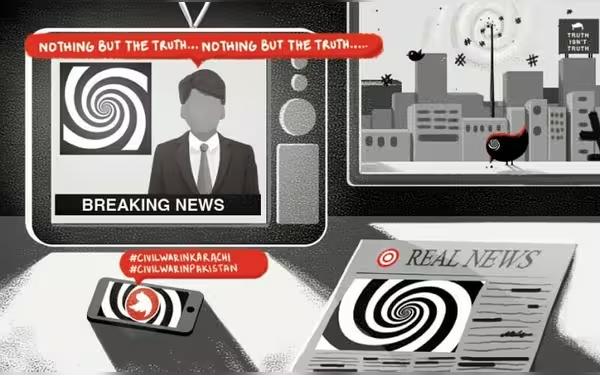Saturday, November 16, 2024 07:40 PM
Erosion of Trust in Journalism Amid Rising Polarization
- Journalists face increasing threats globally.
- Populist governments undermine independent media.
- AI-generated news complicates information credibility.
 Image Credits: dawn
Image Credits: dawnThe rise of polarization threatens journalism's integrity, with increasing attacks on reporters and declining trust in media.
The world of journalism is facing unprecedented challenges, particularly in the context of rising polarization and the erosion of trust in media. In recent years, we have witnessed a disturbing trend where journalists are increasingly targeted, not just in conflict zones like Gaza, but also in countries like Mexico and Argentina. The grim reality is that the safety of journalists is under constant threat, and their work is often met with hostility rather than respect.
Investigations, such as those conducted by the Forbidden Stories collective, reveal that many journalists have been deliberately targeted for their reporting. This alarming trend is compounded by the fact that newsrooms are now instructed to hide press armbands, a clear indication of the dangers faced by those in the field. The situation is so dire that security budgets for media organizations are skyrocketing, reflecting the urgent need for protection in an increasingly hostile environment.
Moreover, the rise of populist governments has further complicated the landscape for journalists. For instance, the recent actions of Argentina’s Milei government, which included shutting down the Télam news agency and cutting off government advertising revenue for major newspapers, highlight the precarious position of the media. Such moves are not isolated; they are part of a broader strategy to undermine independent journalism, with the media and judiciary often being the first targets.
In addition to physical threats, journalists are also grappling with the psychological toll of their profession. Many now live in fear that their past work could be weaponized against them, leading to a culture of self-censorship. The stigma surrounding “factual journalism” as a tool of the establishment has only added to this pressure, forcing organizations to abandon their commitment to neutrality.
The consequences of this polarization are evident. Trust in media is declining, job cuts are rampant, and the rise of artificial intelligence has transformed search engines into mere answer engines, sidelining traditional journalism. The proliferation of AI-generated “cheap news” sites further pollutes the media landscape, making it increasingly difficult for audiences to discern credible information from misinformation.
Every day, we are bombarded with “breaking news” stories that often come with a twist—information taken out of context or outright fabricated. Conspiracy theories have become commonplace, and destabilization campaigns are so frequent that they rarely make headlines. The deletion of hundreds of thousands of accounts by social media platforms has become a routine announcement, yet the impact of disinformation continues to grow.
What is truly surprising is the lack of a strong reaction to these developments. Journalists who have faced these challenges often express feelings of loneliness and powerlessness. The question arises: where are the prominent voices advocating for the protection of journalists and the integrity of factual reporting? The silence is deafening.
As we approach World News Day, it is crucial to reflect on the state of journalism and the importance of raising awareness about these issues. If this day can spark even a modest reaction, it will serve as a reminder of the vital role that journalism plays in our society. The fight for truth and accountability must continue, and it is up to all of us to support those who risk their lives to bring us the news.













